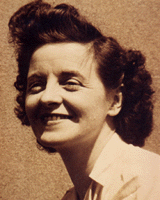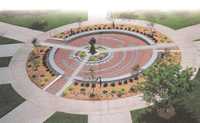
Nesta J. Genter
is honored with a Brick from Richard Genter and Gwendolyn Wilderson (Genter).
 My family, which consists of my brother Richard and I (Gwendolyn), have been searching for years to be able to honor the memory of our mother, Nesta Jane Genter. The following is an account of her life that we have researched through friends, family, and newspapers to be factual and to the best of our knowledge. Our mother died when we were children, thirty-five years ago. Her life is remembered on her headstone with the following inscription: "TO KNOW HER WAS TO LOVE HER" 1914-1964.
My family, which consists of my brother Richard and I (Gwendolyn), have been searching for years to be able to honor the memory of our mother, Nesta Jane Genter. The following is an account of her life that we have researched through friends, family, and newspapers to be factual and to the best of our knowledge. Our mother died when we were children, thirty-five years ago. Her life is remembered on her headstone with the following inscription: "TO KNOW HER WAS TO LOVE HER" 1914-1964.
How do you honor the memory of someone who had always focused her life on doing for others? Her life was like that of a heroine from a romance novel. The fabric of her life was woven across two continents. Among the memories cherished are of a young and selfless Welsh girl who gladly risked her life, pitting strength and courage against an angry sea to rescue two children who had strayed too far down a river's mouth and were trapped in the surging tide and breakers.
Two little boys named Dewi Thomas, age 10 of Ynyswen, Aberporth, and Maldwyn Bevan, age 9 of Twyn, Merrtyr Tydfil (these villages are in Cardigan, Wales), had gone into the water to bathe. Standing on top of the bank, Nesta Williams (age 17) of Emlym, Aberporth, noticed that the young boys were being carried away by the tide. The young girl at once ran down to the beach and without waiting to divest herself of any clothes, plunged into the sea and swam out to the rescue. Nesta swam out to the farthest boy, Dewi Thomas, and despite his struggles (only his hands were to be seen above the water) held him up until help arrived. Nesta herself was drawn under the water twice with the struggling boy.
Captain Simon Thomas of Penygraig also swam out to help the girl. Captain Stephen James of Avalon, Aberporth who was in a boat in the bay, also went to the assistance of the girl and the boys. Captain James threw a lifebelt to the girl, but in grasping for the belt, she lost her grip on the boy. She immediately let go of the lifebelt and once again swam and caught hold of Thomas. Captain James then left the boat and jumped into the sea after the boy, Bevan, and succeeded in getting a hold of him. Captain Thomas, seeing the boat now going seawards on its own, swam across to the boat and brought it to Nesta and the boy. All were drawn aboard and landed on the beach. Artificial respiration was used for considerable time before the boys recovered. In commemoration of her heroic deed, she was awarded the Bronze Medal by the Royal Humane Society, and a citation was presented to her by Prince Edward, Prince of Wales. (Edward, the former King of the British Commonwealth, later became the Duke of Windsor.)
Nesta's life continued on. She became involved in the war efforts, suffering the personal loss of her brother, Simon Williams. Simon was a navigator killed in action over the Netherlands during World War II. Her sister, Ellen, married an American soldier, and this is where Nesta's next chapter of unselfishness begins. Ellen moved to the United States and soon had four children. It was when Ellen became sick that Nesta gave up her job and life in Wales to help take care of her nieces and nephews in 1949.
Nesta was trained as a nurse in Wales, and when Ellen recovered, she took a job in the tuberculosis sanitarium in Norton, Kansas. This hospital was a place no one wanted to work. This was a disease without a cure, just bed rest and experimental treatment for TB patients. Our father, Charles Genter, was a very sick man at Norton in the sanitarium, and Nesta Williams became his nurse. Not only did her loving care bring him back from an almost certain death, it also began a love that overcame tremendous obstacles. The two were married in 1951 and began a new life together in Wichita where Charles went to work at Beechcraft. Nesta became a homemaker and gave birth to first a boy in 1952 and then a girl in 1956, the American dream.
Nesta became a U.S. citizen in 1961 and never returned to her homeland of Wales. Our mother, who had spent most of her life helping others, tragically lost her life to cancer in 1964. She never spoke of the rescue or her bronze medal given by the Prince of Wales.
When my brother Richard and I (Gwendolyn) get together to share the memories we have of our mother, we realize that her life shaped ours in the short time that we were able to spend with her. We both share the ability to give ourselves to others without asking for any rewards in return. Also instilled is the ability to continue forward in our lives no matter what burdens or obstacles we encounter. We bring our mother's accomplishments and honor to WSU, her legacy kept alive forever in this special haven, the Plaza of Heroines.
Submitted by Gwendolyn M. Genter Wilderson and Richard Charles Genter
July 28, 1998










